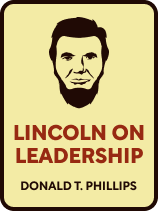

This article is an excerpt from the Shortform book guide to "Lincoln on Leadership" by Donald T. Phillips. Shortform has the world's best summaries and analyses of books you should be reading.
Like this article? Sign up for a free trial here.
Are you looking for Lincoln on Leadership quotes by Donald T. Phillips? What are some of the most noteworthy passages worth revisiting?
In his book Lincoln on Leadership, Donald T. Phillips examines Lincoln’s leadership methods and how they can be applied in today’s complex world. Unlike other authors, Phillips doesn’t just focus on what Lincoln did—he also focuses on how he did it.
The following quotes highlight some of the key ideas.
Lincoln on Leadership: Executive Strategies for Tough Times
In his book Lincoln on Leadership, Phillips uses historical events, documents, and speeches to explain Lincoln’s leadership style. Then, he outlines how you can adopt Lincoln’s methods for yourself and your organization.
(Shortform note: Lincoln on Leadership is part of a specific genre that draws lessons on contemporary leadership from the biographies or histories of important past leaders. Examples of this genre include How to Be a Leader: An Ancient Guide to Wise Leadership (a compilation of essays from first century CE historian Plutarch), Doris Kearns Goodwin’s Leadership: In Turbulent Times, and Brent Taylor and Mindi Bach’s Presidential Leadership. All of these works examine the lives and decisions of past leaders to learn how they succeeded or failed—and then try to present these lessons in a way that’s accessible and applicable to any type of organization.)
Here is a selection of Lincoln on Leadership quotes by Donald T. Phillips:
“If subordinates, or people in general, know that they genuinely have easy access to their leader, they’ll tend to view the leader in a more positive, trustworthy light.”
Phillips writes that Lincoln would often go out of his way to be accessible to his subordinates. He accomplished this by spending a lot of his time talking with others—from high-ranking generals and politicians to common soldiers and farmers. He’d frequently visit people where they lived or worked and had an “open-door” policy where people could come talk to him at any time. In addition to meeting lots of people, Lincoln also made himself accessible through his demeanor and rhetoric: He was friendly, had a good sense of humor, rarely gave harsh commands or orders, and used clear and simple language to connect with whoever he talked to.
“Messages are more often “heard” when the communicator is honest, sincere, and succinct. In other words, say what you mean, and mean what you say.”
A major part of Lincoln’s legacy was his moral code, especially when it comes to telling the truth. Lincoln didn’t just hold himself to a high honesty standard but encouraged everyone around him to do the same, which earned him the nickname “Honest Abe.”
(Shortform note: Some historians argue that “Honest Abe’s” moral conduct was more of a myth than a historical reality. They suggest that Abraham Lincoln’s honesty reputation was in part created by the people around him (especially after his death). These historians explain that while Lincoln was in many cases an ethical man and politician, people shouldn’t take that to mean he never lied or never went against his moral beliefs. These things did happen—for instance, early in his political career, Lincoln once wrote anonymous letters making vicious personal attacks against a political rival.)

———End of Preview———
Like what you just read? Read the rest of the world's best book summary and analysis of Donald T. Phillips's "Lincoln on Leadership" at Shortform.
Here's what you'll find in our full Lincoln on Leadership summary:
- A look at what Abraham Lincoln did and how he did it
- Leadership lessons you can learn from Lincoln
- Why you should consult together and decide alone






